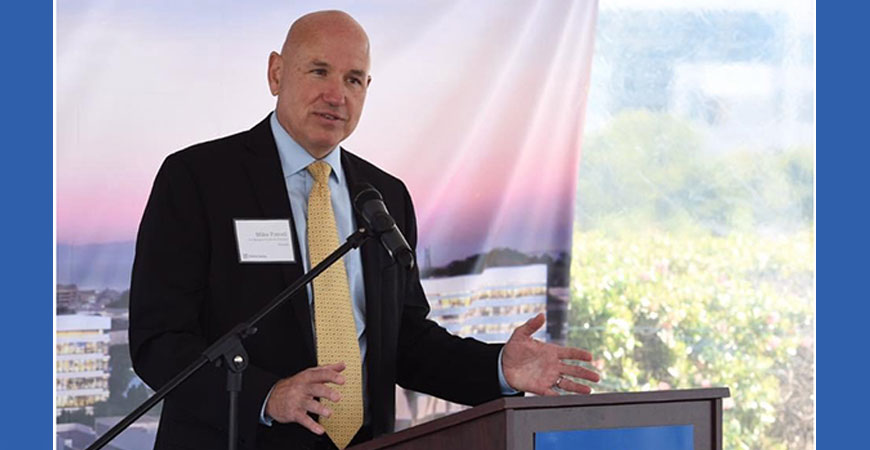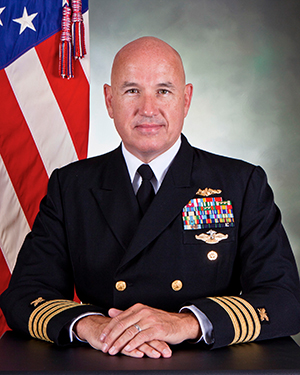
Glancing at Mike Futrell’s resume, one might ask, “What hasn’t he done?”
He is a retired United States Navy captain with two submarine tours under his belt and 26 years of service; a former member of the Louisiana House of Representatives; a former senior staff member in the U.S. Senate; and he practiced corporate law for over a decade and is still licensed in Hawaii and Louisiana. Futrell has served as a California city manager for more than a decade.
He is also a graduate student at UC Merced.
As city manager in South San Francisco for nearly nine years, he drove the city out of the economic doldrums of the 2008 Great Recession, building its biotechnology business sector to become the largest single life science research cluster in the world with over 250 companies, while strengthening the city’s finances and achieving its first AAA credit rating.
He managed the city through the COVID-19 pandemic, opening the Economic Advancement Center to help businesses and residents recover, while expanding transit, building housing and completing the Economic Advancement Center to help businesses recover.
In 2023, Futrell started a new position as the city manager in Riverside, serving 325,000 residents, leading a staff of 2,600 employees, and managing an annual budget of $1.3 billion. He said he relocated from Silicon Valley because Riverside is California’s next great city.
“Riverside is a city on its way up; talented and hungry to succeed. I want to be a part of that exciting journey,” Futrell said. “All my life experiences to this point have contributed to what I believe will be my greatest success here in Riverside.”
Futrell earned a bachelor's degree in business/public administration and juris doctorate degree from Louisiana State University, and a Master of Business Administration from the University of Massachusetts-Amherst.

Now, the Baton Rouge native is midway through his Ph.D. research in UC Merced’s Management of Complex Systems (MCS) graduate program — a multidisciplinary doctoral training at the nexus of complex systems and management science — that he started in 2021.
“I’m a firm believer in lifelong learning. And this is just part of that journey,” he said. “It’s hard to find a more complex system than running a city. It is like a living organism in so many ways; it’s constantly changing.”
Futrell said his true motivation as a leader is team building, a topic that fits nicely into his Ph.D. research.
“As a city manager, I have to hire great people and empower, support and motivate them to rise to their highest and best selves,” Futrell explained. “The lure of pay and benefits will only get you so far. We must understand the intrinsic reasons why some teams succeed and others fail. How do we motivate employees to not just show up and do their jobs but also be really invested in the vision? And how do we communicate that to others?
“The academic studies on that and how that works has really shaped my thinking.”
He found that “government performance” was too broad an area for his dissertation research under the guidance of management Professor Russ McBride, so he narrowed his focus to the budget process and how it feeds into creating a higher performance team.
At UC Merced, he is examining how budgets interplay in organizations and the intrinsic motivation that comes from them.
“It’s well documented that budgets can be a destructive force for organizations, but there’s little research on what to do about that,” Futrell said. “Most people believe there’s nothing you can do about that; that’s not true.”
From his decades of experience, he’s found some of the common information people believe about budgets is destructive behavior that leads to distrust and poor relationships between departments.
“Nobody likes to hear, ‘That’s a great idea. We should do that, but we don’t have the money. Bring it up in next year’s budget,’” he said. “That kills innovation.”
Futrell is investigating how to develop better strategies to move away from the negative forces of budgets.
“It’s destructive how people must fight for those pots of money. There’s a lack of transparency,” he said. “I’ve seen over the years how that is not serving the public well and it’s not serving ourselves.”

He joined the MCS program alongside his wife, Susan Freeman, who is further along in pursuing her Ph.D. at UC Merced.
As chief executive officer and founder of the Conscious Inclusion Company, Freeman works with clients on systemic changes to policies, practices, pay and pipeline to promote equity in the workplace.
She is on her own research path at UC Merced, examining how arrangements of people, organizations, information, technology and the natural world give rise to complex adaptive phenomena that pose difficult challenges to society.
Since they started the MCS program, the couple has taken the same courses with one exception.
“That’s been one of the enablers for me,” Futrell said. “The fact that we can pursue our Ph.D.s together makes us stronger as a couple.”
It was the MCS program itself that steered Futrell to UC Merced to add a doctoral degree to his toolbox of qualifications.
“The Management of Complex Systems program, which is new, appealed to me as the direction that I should go to continue to improve in my profession,” Futrell said. “The program is very good for what I do as a city manager.”
Futrell said he is committed to expanding his abilities and way of thinking to accomplish the job.
“The work at UC Merced has already honed my thinking and my approach,” he said. “I am still working hard at my research to complete the Ph.D., but it fits nicely with my real-world work.”
The Management of Complex Systems program, which is new, appealed to me as the direction that I should go to continue to improve in my profession.



